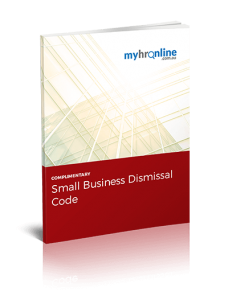One of the more stressful times for any business operator is having to dismiss an employee. For a small business the issue is further complicated having less support during the process from in-house experts such as a Human Resource Manager. Also because of this, it is unfortunate that many small business owners are not aware of a section of the Fair Work Act entitled “The Small Business Fair Dismissal Code” (SBFDC). 
In a “small business” employees cannot lodge an unfair dismissal application within the first 12 months of their employment. After this period, if an employer has complied with the requirements under the SBFDC whilst dismissing an employee, then it will be considered as fair.
What is a Small Business?
A business is classified as a small business employer if it employs fewer than 15 employees at the time of the dismissal of the employee for misconduct or poor performance. A small business employer will be required to provide evidence of compliance with the SBFDC if the employee makes a claim for unfair dismissal to the Fair Work Commission.
Basically, the SBFDC consists of a checklist that must be followed by a small business to ensure that they comply with the unfair dismissal laws.
What are the types of dismissals
Summary dismissals
This type of dismissal refers to an employee’s termination without providing notice or warning. The SBFDC deems it to be fair to dismiss an employee in this manner if the employer believes that the employee’s conduct is sufficiently serious to justify termination. These grounds are justifiable when for example an employee commits:
- theft
- fraud
- violence
- serious breaches of work health and safety procedures
Whilst employers are not required to prove that the conduct occurred, they are required to provide evidence that proves their belief to be true.
Performance or Conduct dismissals
In most other cases, the employer must provide the employee with a verbal or written warning that they may be dismissed. The reason must be a valid one, and based on the employee’s conduct and/or capacity to do their job. The employee must be given an opportunity to rectify the problem/issue, which may entail additional training and ensuring that the employee is fully aware of their job expectations. After a reasonable amount of time has lapsed, and the employer is still not fully satisfied with the employee’s conduct or performance, the employment contract may be fairly terminated.
Required evidence from the small business employer
In claiming that a dismissal was fair, the employer will be required to provide the following forms of evidence to show that they have successfully met all of elements to the SBFDC:
- A completed checklist;
- Copies of written warnings (not for summary dismissals);
- Termination statements; and
- Signed witness statements.
Ensue you have compliant Employment Contracts and HR Policies
An employment contract is a legally binding agreement between two parties, the employer and the employee, and is designed to give both parties security and protection. Compliant employment contracts provide the employer with the security that the employee is fully aware of their obligations and has agreed to comply with the stated terms.
Also, employees need to have a clear, shared understanding of what is (and is not) acceptable behaviour. Setting clear and specific behavioural standards in the form of HR policies and procedures establishes a framework for identifying and addressing violations of those standards.
Some common mistakes
Below are a few of the common mistakes we find small business employers make when dismissing employees.
- Think they are a small business when they are not
Many employers think they are a Small Business Employer when they are not. For example, an employer which is ‘grouped’ with other businesses must include those other businesses’ employees in the headcount. Also, regular casual employees who are employed on a ‘regular and systematic basis, need to be included in their headcount.
- Not following the Small Business Fair Dismissal Code
Many small business employers fail to follow the guidelines set out in the SBFDC. If an employee makes an unfair dismissal claim and a Small Business Employer is not able to demonstrate to the Fair Work Commission that they followed the guidelines in the Code, the claim would most likely fail.
- Fail to warn the employee
There is still an expectation that those employers will give a warning that there is a risk of termination to an employee. Failure to provide at least one warning will make an unfair dismissal claim difficult to rebut.
- Dismissal was not a ‘genuine redundancy’
Also, a relatively little-known fact is that a Small Business Employer is not required to provide redundancy pay. For this reason, some employers try to use this as a ‘loophole’ to terminate longer-term employees, instead of going through the SBFDC process. An employer cannot make an employee redundant just by calling them redundant.
- Little or no records
Without records that a warning was given to an employee, an unfair dismissal claim can become difficult. Records should be kept of any warnings, emails or other communication such as meeting notes.
What Small Business Employers should do
Small Business Employers should familiarise themselves with their rights and obligations in relation to their employees. The SBFDC can be downloaded from our web site for free by following this link, https://myhronline.com.au/?s=small+business+dismissal+code and can also be found on the Fair Work Commission website.
At myhronline we provide HR support without the hassle – specialising in small to medium sized businesses. Our online shop offers easy access to a range of HR forms, documents, letters and templates for whatever your business needs